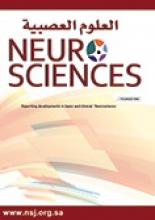Abstract
OBJECTIVE: The aim of the study is to determine: 1) the frequency of patients admitted for phenytoin toxicity and their economic burden; 2) the clinical symptoms and signs of intoxication; 3) the causes or risk factors of intoxication, and 4) the ways to prevent phenytoin toxicity.
METHODS: Retrospective review of hospital ICD coded database between 1987 and 1998. All patients with phenytoin intoxication were reviewed.
RESULTS: Thirty-one patients were admitted 35 times for phenytoin toxicity. Phenytoin intoxication accounted for 1/5,000 admissions. Ataxia, confusion, dysarthria and nystagmus were the most common signs. The outcome was benign except for one patient who remained with a residual cerebellar syndrome. Unawareness of phenytoin pharmacokinetics, lack of clinic follow-up visits, infrequent serum level monitoring following drug dosage change and using wrong doses accounted for most of the cases.
CONCLUSION: Phenytoin intoxication rarely leaves any permanent sequelae but can be a cause of significant transient morbidity and prolonged hospitalization. As the major causes were related to poor follow-up or were iatrogenic, a better patient education and a stepwise dose increase based on serum level, together with drug level monitoring 2-4 weeks after dose change could decrease the incidence and severity of phenytoin intoxication.
- Copyright: © Neurosciences
Neurosciences is an Open Access journal and articles published are distributed under the terms of the Creative Commons Attribution-NonCommercial License (CC BY-NC). Readers may copy, distribute, and display the work for non-commercial purposes with the proper citation of the original work.






